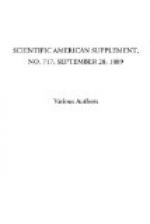* * * * *
HEAT IN MAN.
At a recent meeting of the Physiological Society of Berlin, Prof. Zuntz spoke on heat regulation in man, basing his remarks on experiments made by Dr. Loewy. The store of heat in the human body at any one time is very large, equal, in fact, to nearly all the heat produced by the body during twenty hours, hence the heat given off to a calorimeter during a given period cannot be taken as a measure of the heat production. This determination must be based rather upon the amount of oxygen consumed and of carbonic acid gas given off. The purpose of the experiments was to ascertain what alteration the gaseous interchange of the body undergoes by the application of cold, inasmuch as existing data on this point are largely contradictory.
The observations were made on a number of men whose respiratory gases were compared, during complete rest, when they were at one time clothed, at another time naked, at temperatures from 12 deg. to 15 deg. C., and in warm and cold baths. Each experiment lasted from half an hour to an hour, during which period the gases were repeatedly analyzed. As a result of fifty-five experiments, twenty showed no alteration of oxygen consumption as the result of cooling, nine gave a lessened consumption, while the remaining twenty-six showed an increased using up of oxygen. This diversity of result is explicable on the basis of observations made by Prof. Zuntz, who was himself experimented upon, as to his subjective heat sensations during the experiments. He found that after the first impression due to the application of cold is overcome, it was quite easy to maintain himself in a perfectly passive condition; subsequently it required a distinct effort of the will to refrain from shivering and throwing the muscles into activity, and finally even this became no longer possible, and involuntary shivering and muscular contraction supervened, as soon as the body temperature (in ano) had fallen 1/2 deg. to 1 deg. C. During the first stage of cooling, Zuntz’s oxygen consumption showed a uniform diminution; during the period also in which shivering was repressed by an effort of the will, cooling led to no increased consumption of oxygen, but as soon as shivering became involuntary there was at once an increased using up of oxygen and excretion of carbonic acid.
This explains the differences in the results of Dr. Loewy’s experiments, and may be taken to show that in man, and presumably in large animals, heat regulation as directly dependent upon alteration (fall) in temperature of the surrounding medium does not exist; the increased heat production is rather the outcome of the movements resulting from the application of cold to the body. In small animals, on the other hand, there undoubtedly exists a heat regulation dependent upon an increased activity of chemical changes in the tissues set up by the application




